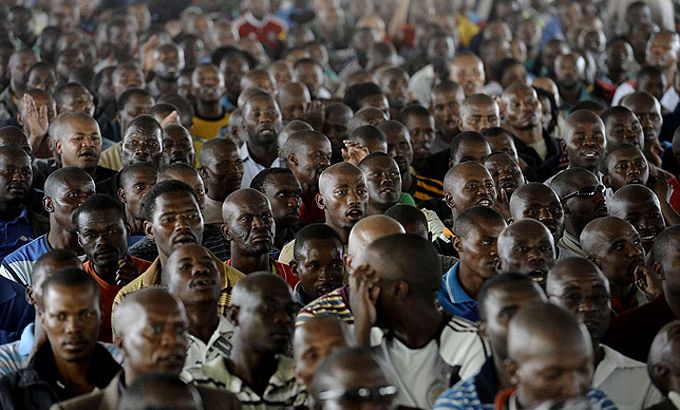South Africa mourns victims of mine carnage
Mood tense as memorial services held for 44 people killed during strike at platinum mine in North West province.

Memorial services have been held across South Africa for the 44 victims of last week’s violence, as President Jacob Zuma announced a judicial commission of inquiry to investigate the deadly incident.
Thirty-four miners were killed last Thursday when police opened fire on them at a Lonmin-operated platinum mine in Marikana in the country’s North West province. Police said they opened fire in self-defence.
Keep reading
list of 4 itemsUK has begun mass arrests of potential Rwanda deportees: What’s next?
World Press Freedom Day: Gaza conflict deadliest for journalists
Israeli firms sold invasive surveillance tech to Indonesia: Report
Ten other people, including two policemen, were also killed in earlier strike violence.
Al Jazeera’s Haru Mutasa, reporting from the site of the shooting where hundreds of people gathered on Thursday to commemorate the victims, said the mood was tense.
“People were very emotional, very angry [at the memorial service], and they want answers,” she said.
“And they kept saying over and over again they feel mine workers should get a pay increase and their living conditions should be improved.
“President [Jacob] Zuma wasn’t at this memorial service. That has disappointed a lot of people and made some people very angry. They feel sidelined by their president, they feel sidelined by their government,” she added.
Zuma, speaking in Pretoria, announced a three-member judicial commission of inquiry to investigate last week’s deadly violence.
The commission’s mandate, among other things, was to investigate the conduct of the mining company Lonmin.
It would also examine the conduct of the SA Police Service, and investigate the conduct of the National Union of Mineworkers (NUM) and its rival, the Association of Mineworkers and Construction Union (AMCU), Zuma told reporters.
A turf war between the ANC-allied NUM and AMCU – which spilled over to other mines along the platinum belt on Wednesday – is raising fears that anger over low wages and poor living conditions could generate fresh violence.
Political battle
Al Jazeera’s Mutasa said the miners and the mining community had earlier told the African National Congress (ANC)-led government, which planned to hold an official memorial service at the site of the shootings, that they would not be dictated to and that they would hold their own service.
| South African miners’ village fury at deaths [Al Jazeera] |
She said the police shooting was giving rise to a political battle, with public criticism growing against the government’s handling of the incident.
Julius Malema, the expelled leader of the ANC Youth League, attended Thursday’s memorial service at Marikana, where he addressed mourners and families of the deceased.
Malema had in the previous days publicly criticised the government and the president.
Mutasa said: “What’s happened in the past few weeks is that [Zuma’s] political opponents have come out and have tried to jump onto the bandwagon … [Malema] whipped people into a frenzy calling for a lot of things to happen, saying to them that the ANC and President Zuma isn’t looking out for their interests.”
Malema said the government had turned in the people and he urged the workers to continue their strike.
He had earlier led miners to a police station on Tuesday to open a murder case against the policemen who opened fire on the striking miners.
The violence started when mine workers demanding a pay rise started the strike, which degenerated into clashes as police clashed with armed miners.
Unrest could spread
Analysts have raised concerns that the unrest could spread to gold producers.
|
“The platinum industry is experiencing increased levels of industrial action … These developments pose a significant risk to the industry“ – Terence Goodlace, |
Impala Platinum, the world number two platinum producer, also gave warning on Thursday that the industrial action could become more widespread.
“The platinum industry is experiencing increased levels of industrial action … These developments pose a significant risk to the industry,” Terence Goodlace, Impala’s chief executive, said.
Goodlace said the trade union rivalry was still “fairly volatile”.
Labour disputes in South Africa’s platinum belt have turned increasingly violent this year.
In February, three people died at the Impala’s mine during a wildcat strike.
The strike at Lonmin’s Marikana mine has driven up platinum prices and stoked worries about investing in Africa’s biggest economy, where chronic unemployment and income disparities threaten social stability.
Platinum prices were at it highest in three and a half months and signs that of the turf war between unions will spread looked set to increase it further as investors refocus on supply risks rather than demand.
Platinum mining companies are struggling to reconcile opposing pressures to improve employment terms while dealing with a sharp drop in demand, which forced prices below the cost of production.
Swiss bank UBS said the situation in South Africa could take weeks to resolve.
It estimated a loss of platinum production from the unrest of up to nearly 70,000 ounces, and flagged potential for trouble to spread to bigger producers.